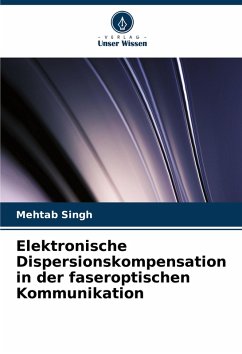
Dispersion Managed Solitons
In optical communication system with symmetric and asymmetric dispersion map
Versandkostenfrei!
Versandfertig in 6-10 Tagen
52,99 €
inkl. MwSt.

PAYBACK Punkte
26 °P sammeln!
Dispersion managed (DM) optical communication systems have remain important research area in recent years because they offer very high bit rate data transmission and improved performance in comparison to the conventional soliton based systems. In a DM system, fiber dispersion varies alternately between anomalous and normal values. This variation is maintained periodically and the average dispersion over a period could be positive, negative or even zero. The DM solitons have many advantages over conventional solitons, for example, they are less influenced by the Gordon-Haus timing jitter and co...
Dispersion managed (DM) optical communication systems have remain important research area in recent years because they offer very high bit rate data transmission and improved performance in comparison to the conventional soliton based systems. In a DM system, fiber dispersion varies alternately between anomalous and normal values. This variation is maintained periodically and the average dispersion over a period could be positive, negative or even zero. The DM solitons have many advantages over conventional solitons, for example, they are less influenced by the Gordon-Haus timing jitter and collision induced frequency shifts, have enhanced signal to noise ratio and suppressed four wave mixing processes in WDM systems. A high bit rate communication system uses optical signals of the order of few picoseconds. With such a small pulse width, various higher order linear and nonlinear phenomena such as TOD, quintic nonlinearity, self steepening and intra pulse Raman scattering become dominant. In this book, we have presented influence of these phenomena on the pulse dynamics and intra-pulse collision in DM optical communication systems with symmetric and asymmetric dispersion map.












